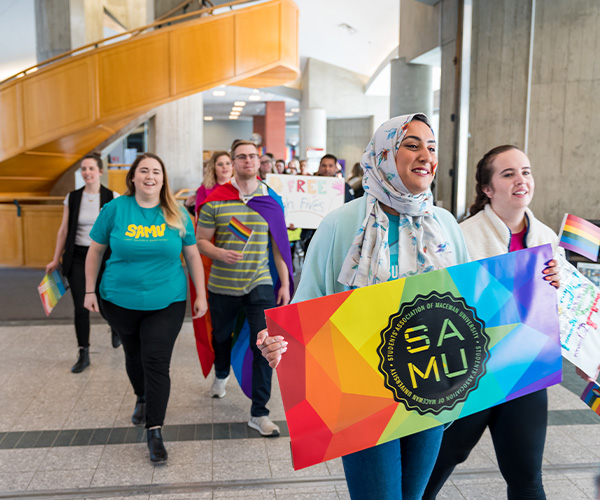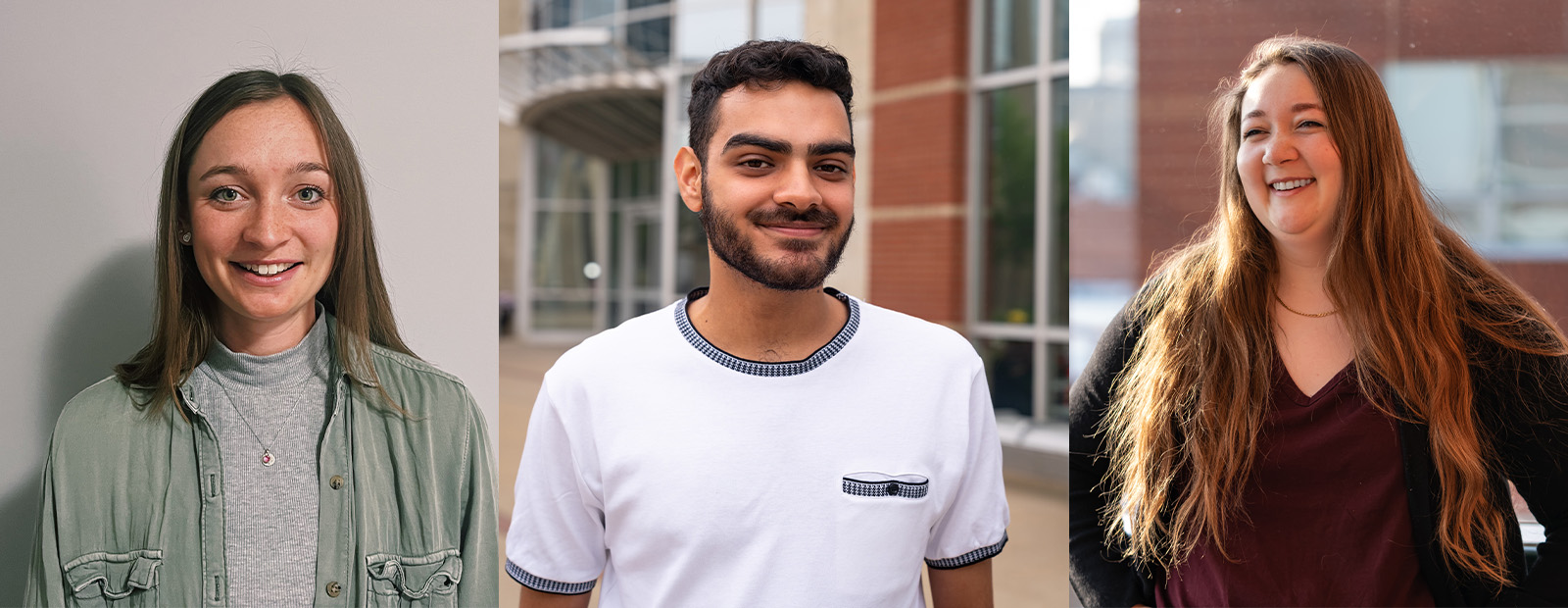Post-secondary institutions are often known for the research done by their faculty, but a number of students also embark on ambitious research projects while they attend classes. The Queer Research Connections Event allowed three MacEwan students to discuss their research as a part of Pride Week.
Noelle Kilbreath, Japkaran Saroya and Alex Tiller presented research into 2SLGBTQIA+ issues at the event on March 6. The students were given the opportunity to detail their work, and to network with faculty and attendees about other research opportunities.
Kilbreath, a fourth-year Bachelor of Science student majoring in Psychology, discussed her research, “What Does Allyship to the LGBTQ+ Community Mean?” She worked closely with Dr. Laura Offrey in creating surveys to uncover how different groups of people define the term “ally.”
“Dr. Offrey and I planned to determine where, if any, discrepancies existed between non-2SLGBTQIA+ participants and 2SLGBTQIA+ participants when defining what behaviours, attitudes and beliefs were necessary for allyship,” says Kilbreath.
She decided on her research topic when she realized that her definition of allyship was different from some others. “In response to the prominent contemporary social justice movements, I've seen many people with privilege hold onto the idea of being a 'good person' and assure themselves that they are not part of the problem, causing so much complicity,” she says.
Kilbreath set out to uncover how different groups define the term, with the hopes that they would be able to produce a better understanding of what allyship truly means, and to create expectations around what those allies can do to help the local queer community.
“We recognize that historically, those in positions of power often get to define what it means to be privileged, marginalized, or an ally. By amplifying the voices of 2SLGBTQIA+ students at MacEwan, we hope to gain a more nuanced definition of what it means to be privileged and how to use that privilege to impact existing social inequalities effectively.”
Kilbreath is still in the analysis phase of her research, so results are forthcoming.
Saroya, a fifth-year Honours Psychology student, is an active team member on the Edmonton Queer History Project (EQHP), and took inspiration from his work there for his thesis project.
“Being able to learn about Edmonton’s queer history has given me a lot of insight,” he says. He became attached to the project through Dr. Kristopher Wells, who Saroya works for as a research assistant. He helped to launch EQHPStories, an interactive part of the project where community members are able to submit their own stories about Edmonton locations.
“We're Queer and We've Always Been Here: The Impact of a Virtual Queer History Tour on 2SLGBTQ+ and Cisgender Heterosexual Young Adults in Alberta” combines Saroya’s work with EQHP and assesses the impact of personal stories on self esteem and impressions of the 2SLGBTQIA+ community.
Saroya designed a survey for queer participants and another for cisgender, heterosexual participants. Queer participants rated their self esteem and levels of internalized homophobia, and other participants rated their attitudes toward gay men and lesbians.
“They watch this short little video about the queer history map, highlighting a few locations, why they're significant and what happened there. We also have notable people like Michael Phair, Alberta's first openly gay elected politician, speak at the locations and share their stories,” says Saroya. Following the video, participants then fill out the same survey to reveal if their opinions have changed.
Saroya is still analyzing the findings of his research, but hopes that it will show that initiatives like the EQHP can positively impact attitudes toward the queer community, as well as to increase the self esteem and pride in identity of those belonging to the community.
Alex Tiller, another Honours Psychology student, wanted her research to deal with outside perceptions of gender minorities. “He Said, She Said, They Said: Gender Identity, Displayed Emotion, and Perceptions of Sexual Assault” deals with how fictitious victims of sexual violence with different gender identities are seen by juries in court depending on their outward display of emotions.
“Emotionality is a very gendered thing,” she says. “There are a couple of papers that look at how gender minorities are perceived as far as overall credibility, but there was nothing dealing with their emotions specifically.”
Tiller worked with Dr. Kristine Peace to set high and low emotion conditions, and then to compare the differences between cisgender, transgender or non-binary people in those conditions, specifically in court cases dealing with sexual assault.
“We found overall with the high emotion condition there were higher severity ratings and higher guilt ratings, but when we looked at our applied sample, we saw that there was a bit of a weird thing going on,” says Tiller. “If transgender women had low emotion, they were seen as less credible. And if non-binary people had high levels of emotion, they were seen as less credible. So we did find that there are specific biases against gender minorities in mock juror settings.”
Her research is important in understanding and counteracting biases in order to ensure fair trials for genderqueer victims of sexual assault. Tiller says she’s planning to pursue a career in forensics or corrections, where she may be able to put her conclusions to use.
To check out more queer-focused events this week, head to MacEwan.ca/PrideWeek.
 Read the full story.
Read the full story.
